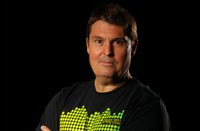
Professor Robert Newton
Position:
- Foundation Professor of Exercise and Sports Science, Edith Cowan University Health and Wellness Institute, Edith Cowan University
Credentials:
- PhD at Southern Cross University
Websites:
- http://www.ecu.edu.au/schools/exercise-and-health-sciences/staff/profiles/professors/professor-robert-newton
- http://scholar.google.com.au/citations?user=cgIeyG8AAAAJ&hl=en
- http://www.researcherid.com/rid/A-3466-2009
- https://www.researchgate.net/profile/Robert_Newton/?ev=hdr_xprf
- http://au.linkedin.com/pub/robert-newton/3a/152/b2
Biography:
Professor Robert Newton, PhD, AEP, CSCS*D, FESSA, FNSCA
Professor Robert Newton is the Foundation Professor in Exercise and Sports Science in the Edith Cowan University Health and Wellness Institute, Perth, Western Australia. Prior to appointment at Edith Cowan University, Professor Newton was Director of the Biomechanics Laboratory, at Ball State University in Indiana. He has also worked at the Pennsylvania State University as a visiting research fellow in the Center for Sports Medicine. Current major research directions include: reducing decline in strength, body composition and functional ability in cancer patients; cancer related fatigue and the influence of exercise; management of lymphedema secondary to breast cancer, physical activity and the prevention of falls and frailty in the elderly.
Professor Newton is an Accredited Exercise Physiologist, Certified Strength and Conditioning Specialist with Distinction with the NSCA, Fellow of Exercise and Sports Science Australia and Fellow of the National Strength and Conditioning Association (NSCA). In 2004 he was awarded Outstanding Sports Scientist of the Year by the NSCA. He has published over 220 refereed scientific articles, two books, 14 book chapters and has a current h-Index of 56 (GoogleScholar http://scholar.google.com.au/citations?user=cgIeyG8AAAAJ&hl=en) with his work being cited over 12,245 times. As of 2013 his research had attracted over $13Million in competitive research funding
Best publications:
- Cormie, P., R.U. Newton, D.R. Taaffe, N. Spry, D. Joseph, M.A. Hamid and D.A. Galvão. Exercise maintains sexual activity in men undergoing androgen suppression for prostate cancer: a randomised controlled trial. Prostate Cancer and Prostatic Diseases, Published online 15 January 2013. doi:10.1038/pcan.2012.52.
- Newton, R.U., D.R. Taaffe, N. Spry, P. Cormie, S.K. Chambers, R.A. Gardiner, D.H.K. Shum, D. Joseph and D.A. Galvão. Can exercise ameliorate treatment toxicity during the initial phase of testosterone deprivation in prostate cancer patients? Is this more effective than delayed rehabilitation? BMC Cancer, 12(432):1-8, 2012.
- Galvão, D.A., D.R. Taaffe, N. Spry, D. Joseph, and R.U. Newton. A combined resistance and aerobic exercise program reverses muscle loss in men undergoing androgen suppression therapy for prostate cancer without bone metastases: a randomized controlled trial. Journal of Clinical Oncology. 28(2): 340-347, 2010.
- Newton, R.U., D.R. Taaffe, N. Spry, R.A. Gardiner, G. Levin, B. Wall, D. Joseph, S.K. Chambers, D.A. Galvão. A Phase III clinical trial of exercise modalities on treatment side-effects in men receiving therapy for prostate cancer. BMC Cancer, 9:210, 2009.
- Galvão, D.A. and R.U. Newton. A Review of Exercise Intervention Studies in Cancer Patients, Journal of Clinical Oncology, 23(4): 899-909, February 2005. Impact factor 18.970. Times cited 79.
exercise medicine, osteoporosis, cancer related fatigue, functional capacity.


